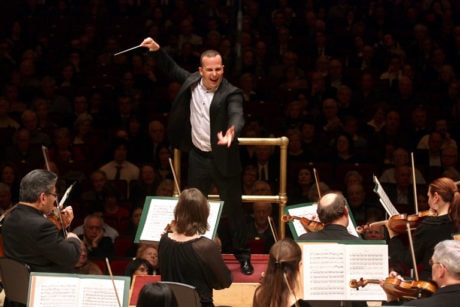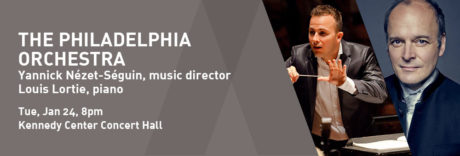It is easy to understand why The Philadelphia Orchestra has tapped Yannick Nézet-Séguin to be their music director and conductor of such a prestigious institution. Yannick exudes charisma and delivers one of the most dynamic and physical conducting performances that I have ever witnessed. The French-Canadian conductor is not only energetic and engaging with his musicians, he involves the audience making the large orchestra accessible.
Last night, he introduced the program performed at The Kennedy Center’s Concert Hall by letting us know that this particular performance was part of their successful Paris Festival, which although does not necessarily feature French composers, it featured two composers that ended up calling Paris home: Chopin and Stravinsky. But before entering the program full-force, Yannick offered a small performance, an “amouse-bouche” as he called it, a short piece by French-born composer Lili Boulanger. The piece, “From a Spring Morning,” was a lovely and inspired choice that started the night on a lighter tone, making for a remarkable first act.

After some rearranging that included bringing out a Steinway piano, Louis Lortie joined the orchestra for Chopin’s Piano Concerto No. 1. It was a wonderful performance, remarkable for its technical precision. Lortie’s piano soared above the orchestra and the musicians played back in a performance that was the highlight of the night. There is a romance and calm to the Chopin’s Piano Concerto No. 1 that is reminiscent of a Spring evening, or falling in love. It was certainly a sentiment that was transmitted in last night’s performance. Lortie was able to do justice to the genius of Chopin.
After a short intermission, the performance turned more solemn to Igor Stravinsky’s Petruschka, a piece that conjured many visual images from the story which tells the story of a love triangle. Although Petruschka is a puppet story and focuses on three main characters, the emotions it elicits are human and universal. At the center of the love triangle is a ballerina, who has to choose between the Moor and Petruschka. After the ballerina rejects Petruschka there is a fit of rage and a challenge to Moor, which ends with Petruschka dying.
The tragedy involved in this story is conveyed through the music as it starts with a gorgeous melody somewhat reminiscent of Spring time, yet it quickly speeds up by the mid-point of the piece in a rhythm that depicts a chase and some kind of battle, culminating in the tragic and thunderous fatality.
The Kennedy Center Concert Hall was the perfect venue for this performance, with an expansive Philadelphia Orchestra that brought this music in a lively performance. The audience rose at the end of the night for a standing ovation that had Conductor and Musical Director Yannick Nézet-Séguin return to take a bow more than once.
Running Time:One hour and 50 minutes, with a 10-minute intermission.
Washington Performing Arts presents The Philadelphia Orchestra / Yannick Nézet-Séguin, conductor had a one-night only performance on Tuesday, January 24, 2017, at The Kennedy Center Concert Hall – 2700 F Street, NW, in Washington, DC. For tickets or more information call: (202) 467-4600, or visit their calendar of events.
https://youtu.be/_Y_tLuudGGk





